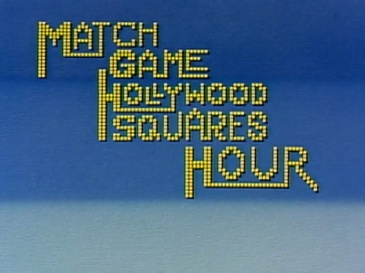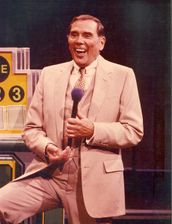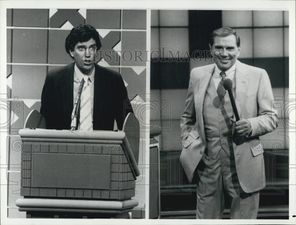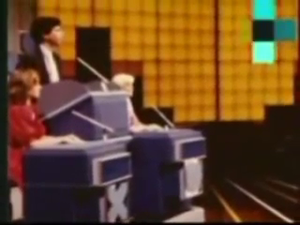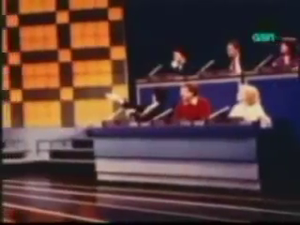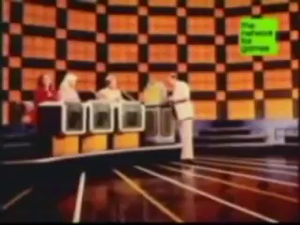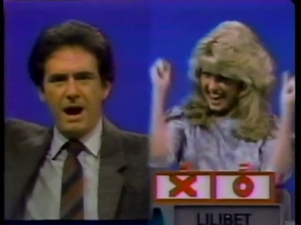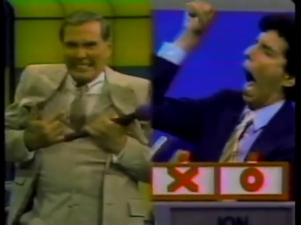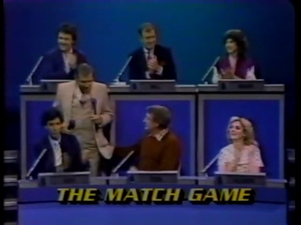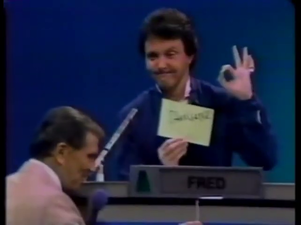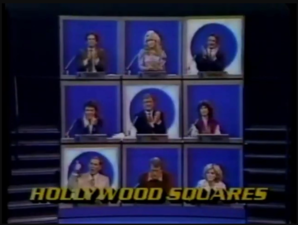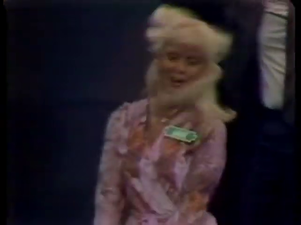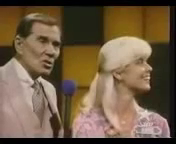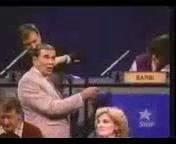Match Game-Hollywood Squares Hour (lost unaired pilot of NBC game show; 1983)
Match Game-Hollywood Squares Hour was an American game show that combined two popular formats (Match Game and Hollywood Squares) into one. It aired on NBC from October 31st, 1983 to July 27th, 1984 and was hosted by Gene Rayburn (for the Match Game portion of the show and the bonus game) and actor Jon "Bowzer" Bauman (for the Hollywood Squares portion) and was announced by legendary game show announcer Gene Wood (and on separate occasions by Johnny Olsen and Rich Jefferies). This was the first time two popular formats would be paired up in one show and has not been attempted since. Before the show was picked up by NBC, a pilot was shot to demonstrate the two formats in action. It had many differences to the aired series.
Aired Format
The show started with the format from Match Game's syndicated format from the 1970s.[1] Two contestants try to fill in the blanks posed by Gene Rayburn and those contestants have to match one or more of the answers written by the six celebrities. Each correct match earns the player one point. The contestants have three chances to match all six stars and the contestant to match the most stars will go on to the Hollywood Squares portion of the show. Three more celebrities are added to the proceedings and the winning contestant faces out with a returning champion from the previous episode. If the match ends in a tie, a fill-in-the-blank question was read and the contestants were shown four possible answers which were faced away from the stars. Each contestant chose an answer by number and then the stars one at a time gave verbal answers. The player whose answer was mentioned first won the game.
The Hollywood Squares portion remains the same as it ever was. Two contestants must get three stars in a row either across, up and down, or diagonally. In order to get the square, Jon Bauman asks the chosen celebrity a question and the celebrity can either give a correct answer or make one up. The contestant must agree or disagree correctly with the celebrity in order to get the square. If the other contestant agrees or disagrees with the celebrity incorrectly in order to block the other contestant's win, the square would go to the other contestant and they would win. Unlike many versions of Hollywood Squares, no secret square is played. Each celebrity that is captured, scores the contestant $25 and a three in a row scores them $100. The game would keep going until the bell rings and the contestant with the most money wins the game and goes onto the Super Match.
The Super Match is played the same as it was during Match Game's 1970s incarnation's first four years. A studio audience was asked to give their best response to a fill-in-the-blink phrase and the best three answers were hidden on the board. The most popular answer scores the contestant $1,000, the second scores them $500, and the third scores them $250. The winning contestant chooses three celebrities with three possible answers and chooses whether to go with one of the celebrity's answers or go with one of their own. If the contestant's chosen answer appears in the two-three, they win the amount that the answer represents. If their answer is not among the three, they win $100. The Head-To-Head match is played slightly differently, nine celebrities have cards in front of them with the numbers 10, 20, and 30 hidden. The contestant chooses the celebrity, and the celebrity reveals what their card holds and the number revealed is the number the player's winnings is multiplied by if they win the Head-To-Head match. The contestant faces Gene while the chosen celebrity writes down an answer to a fill-in-the-blank phrase posed by Gene. Once the celebrity is done writing down their answer, the contestant will give their answer and if they match the chosen celebrity, the contestant's winnings are multiplied by the number the celebrity holds. If they don't match, they win the money they got in the Super Match.
Pilot Format
The format from the pilot is similar to the one that was used in the aired series but with several differences. In the Match Game portion of the show, there are three contestants instead of two and it has been speculated that the lowest scoring player is eliminated, while the two scoring contestants go onto play Hollywood Squares. The Match Game tie-breaker had three answers instead of four. The Bonus Game is played differently as well, according to YouTube user "caholla", "After the audience match, contestant picked a celebrity and either 'X' or 'O'. Celebrity pulled the 'X' or 'O' tab. Behind one tab was the celebrity's name, behind the other a dollar amount. If the tab pulled had a dollar amount, it was added to the pot for the head-to-head match; the contestant called another celebrity and 'X' or 'O'. If the tab pulled had the celebrity's name, the contestant played the head-to-head with that celebrity for the amount in the pot. If contestant cleared the board, they played the last celebrity picked for $100k."
Availability
The pilot was never seen by the public, only a few clips were used in promos for the show (the promos are nowhere to be found). The show in general was never seen again until 2019 when Buzzr aired four episodes of the show on February 17th,[2] and later added to their primetime schedule on September 30th, the show has been on the network ever since. It is possible that while the show was getting digitized by Fremantle (the owners of the Match Game format and owners of Buzzr), the pilot was included, but it's unknown. Several photos from the taping of the pilot were shown in several places, including the now-defunct NBC Experience store in New York City and an unknown documentary that aired on GSN in the mid-2000s. It's unknown where the pilot is or if it will ever surface.
Gallery
External Links
- U.S. Game Shows Wiki page that mentions the pilot.
- Mark Goodson Wiki page on Match Game-Hollywood Squares Hour.
See Also
Pilots
- Showoffs (partially lost unaired pilots of ABC game show; 1975)
- The Price Is Right (partially found unaired pilot for syndicated game show; 1993)
- The New Price Is Right (lost unaired pilot of Goodson-Todman game show; 1972)
- Family Feud (partially found unaired pilot of Pearson game show; 1998-1999)
- Rock Feud (lost unaired pilot of cancelled spin-off of Pearson game show; 2001)
- To Tell The Truth (lost unreleased pilot of Pearson remake of Goodson-Todman panel show; 1999)
- Card Sharks (partially lost pilots of syndicated revival of Goodson-Todman game show; 1996-2000)
Television
- The Price Is Right (partially lost Dennis James episodes of game show; 1972-1977)
- Tattletales (partially found syndicated version of CBS game show; 1977-1978)
- To Tell The Truth (partially found first season of syndicated panel show; 1969-1970)
- The Price Is Right (partially found Australian adaptation of Mark Goodson game show; 1973-1974)
- Snap Judgement (partially found NBC game show; 1967-1969)
- Call My Bluff (partially found NBC game show; 1965)
- Match Game (partially lost Mark Goodson Bill Todman game show; 1973-1982)
- Family Feud - Popular Vs Freaks & Geeks (found episodes of Pearson game show; 2000)
- Family Fortunes (partially lost British version of Goodson-Todman game show; 1980-2002)
- The Price Is Right (partially found Doug Davidson version of Goodson-Todman game show; 1994-1995)
- Match Game (found ABC revival of Goodson-Todman game show; 1990-1991)
- Champion Blockbusters (partially found spin-off of British game show, 1987-1990)
- Släktslaget (lost Swedish adaptation of "Family Feud" game show; 2000)
- Password Plus (found unaired George Peppard episode of Goodson-Todman game show; 1979)
- The Price Is Right (partially lost episodes of CBS game show; 1972-2007)
- Distraction (partially found American adaptation of British game show; 2005-2006)
- I've Got A Secret (partially lost syndicated revival of Goodson-Todman panel show; 1972-1973)
- Press Your Luck (lost British adaptation of American game show; 1991-1992)
- Match Game (partially found revival of Goodson-Todman game show; 1998-1999)
- Showoffs (partially found Goodson-Todman game show; 1975)
- Password (partially found ABC revival of Goodson-Todman game show; 1971-1975)
- Mindreaders (partially found Goodson-Todman game show; 1979-1980)
- Sale Of The Century (partially found Reg Grundy revival of Al Howard game show; 1983-1989)
Miscellaneous
- Super Password (lost builds of unreleased NES port of word game; 1980s)
- To Tell the Truth (lost unreleased DVD game based on panel show; 2005)
References
- ↑ A fansite page with information on how the game show was played. Retrieved 28 Mar '21
- ↑ An article announcing the re-airing of the show. Retrieved 28 Mar '21
